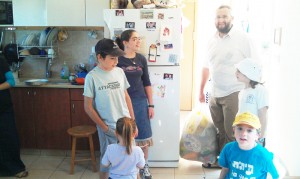Kangaroo Kronicles 30 – The Holy Land Trailer Park
Saturday, October 15, 2011 By Stu Silver ·0
Kangaroo Kronicles 30 – The Holy Land Trailer Park
By
“Uncle Zally” / Stu Silver
______________________________________________
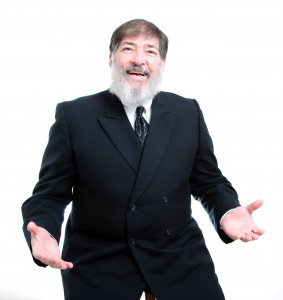 I’m walking down the street in my hilltop village and what do my eyes perceive? No, it can’t be. A mobile home park in the Holy Land?!
I’m walking down the street in my hilltop village and what do my eyes perceive? No, it can’t be. A mobile home park in the Holy Land?!
I’m going to show you lots of pictures, and make this entertaining, but before I do, it’s important to understand cultural differences between Israel, the States, and the Land Down Under.
In the States, and Oz, a home is more like a path, than a permanent dwelling. A young couple (or a single) usually begins with a modest low priced “starter” house. Mobile homes are excellent for this, being the most affordable. Then, as a family grows, and hopefully their income along with it, they trade up into bigger, better homes and neighborhoods.
When old age descends, downsizing begins. Once again, mobile homes are an affordable alternative for retirees on a modest fixed income.
Israel is different. People hold onto their homes. They like to pass them along to children, or grandchildren. Many times the older generation will live together with their younger folks until they go to their final rest. Why?
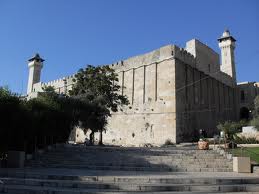 Australia and the States are young, historically, with written histories only in the hundreds of years. Israel’s written history is FOUR MILLENIUM, 4,000 years. Visit the Cave of the Patriarchs in Hebron. Abraham and Sarah’s tomb is 3,700 years old.
Australia and the States are young, historically, with written histories only in the hundreds of years. Israel’s written history is FOUR MILLENIUM, 4,000 years. Visit the Cave of the Patriarchs in Hebron. Abraham and Sarah’s tomb is 3,700 years old.
Add to that the history of my people outside of Israel. We have been scattered to the four corners of the world, improved their cultures and economies, and then were kicked out with just the clothes on our backs.
 So for my people, there is no “better place to go.” There is no “moving up.” Israel is our permanent home, and we have a written deed to it, signed 3,400 years ago. If you want to see the deed, you don’t have to go to the United Nations. Just open the book to my left here – it’s called The Bible.
So for my people, there is no “better place to go.” There is no “moving up.” Israel is our permanent home, and we have a written deed to it, signed 3,400 years ago. If you want to see the deed, you don’t have to go to the United Nations. Just open the book to my left here – it’s called The Bible.
In other words, there is a sense of permanence in Israel you don’t see in young countries like America and Oz. For that reason, Israelis prefer homes built out of stone and cement.
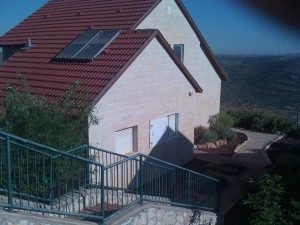 My home, pictured on the left, is made out of stone and cement. It is a modest 1,500 square feet with 3 bedrooms and 2 baths, and an unfinished second floor.
My home, pictured on the left, is made out of stone and cement. It is a modest 1,500 square feet with 3 bedrooms and 2 baths, and an unfinished second floor.
Mobile homes are not looked upon with favor here because they don’t conjure up an image of permanence. They are called caravans (I believe the term is also used in Australia.)
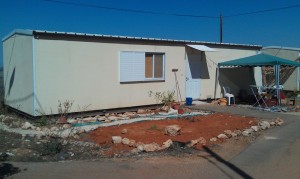 To the left is a mobile home, Israeli style.
To the left is a mobile home, Israeli style.
The hilltop village where I live wanted to add temporary housing for young families, where the husbands just got out of the army and were studying at the university nearby. The village wanted to give them a feel for how nice living here would be, so they would be encouraged to stay on and become part of the community, but in more permanent structures.
The Israeli government, however, would not allow them to bring in already built caravans. Why? Nobody knows. But in typical Israeli fashion, the village got a permit to build houses on site, that looked remarkably similar to caravans, and built to the same standards as permanent housing (just like mobile homes are in the United States.)
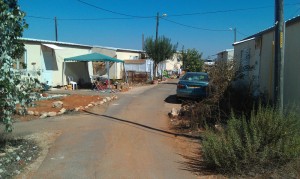 Then the village brought in pre-made walls, floors, and roofs made by caravan companies, and assembled them on site. (By the way, that is called modular housing in the States.) There are 15 of them now. A view of the entrance is pictured on your left.
Then the village brought in pre-made walls, floors, and roofs made by caravan companies, and assembled them on site. (By the way, that is called modular housing in the States.) There are 15 of them now. A view of the entrance is pictured on your left.
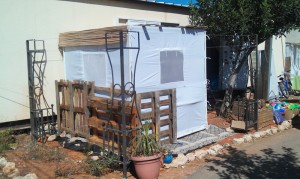 I took these pictures during the holiday of Succot, The Festival of the Booths. The holiday is a joyous time, celebrated by living in a temporary booth for a week. The young families in the caravans built small booths, or succahs, and ate their meals in them, and the men slept in them, as commanded in the Bible.
I took these pictures during the holiday of Succot, The Festival of the Booths. The holiday is a joyous time, celebrated by living in a temporary booth for a week. The young families in the caravans built small booths, or succahs, and ate their meals in them, and the men slept in them, as commanded in the Bible.
The booth was meant to be a reminder of the time we wandered in the desert for 40 years until coming to our permanent home in Israel. We believe their purpose is to make our people thankful for the stability in our lives outside the booth, and the time we relied on God for all our needs.
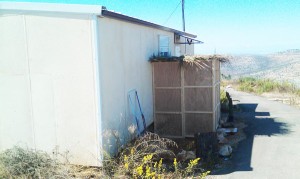 It is ironic that these booths, with walls made of thin wood strips, linen sheets, dirt floors, and roofs covered with palm fronds, are temporary housing at its most temporary, yet they are attached to caravans, which are looked at as temporary housing by Israelis, even though they are constructed to basic standards.
It is ironic that these booths, with walls made of thin wood strips, linen sheets, dirt floors, and roofs covered with palm fronds, are temporary housing at its most temporary, yet they are attached to caravans, which are looked at as temporary housing by Israelis, even though they are constructed to basic standards.
The families that lived there were wondering who the guy with the smartphone was taking pictures. I explained that I was not from the government and looking to tax them … or kick them out. I lived in the village, and wrote a blog about caravans back in the States.
Yes, they thought I was crazy. They didn’t understand why anyone would want to read about caravans. In a brazen act of curiosity, I asked if I could see the inside of one of their homes, and they invited me in.
Here is one family, in the kitchen, with their children and their friends. You will note the husband is holding a bag of trash, preparing to take it out, one of man’s universal chores.
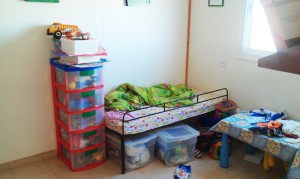 This is the children’s bedroom, which was accompanied by effusive apologies from the mother for being so messy. I wondered, is there any child, anywhere in the world, that has a bedroom that a mother is proud of?
This is the children’s bedroom, which was accompanied by effusive apologies from the mother for being so messy. I wondered, is there any child, anywhere in the world, that has a bedroom that a mother is proud of?
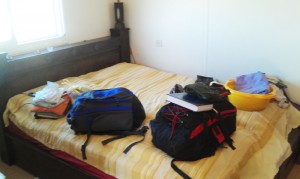 This is the master bedroom. Note the two knapsacks. Those are for the husband’s books when he goes to the nearby university to study mechanical engineering.
This is the master bedroom. Note the two knapsacks. Those are for the husband’s books when he goes to the nearby university to study mechanical engineering.
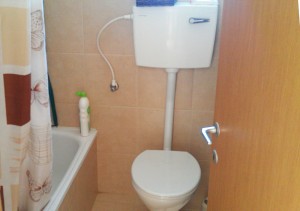 This is a typical Israel bathroom. Note the tank is elevated high above the toilet to give the water extra power. Israeli’s have two types of flushes, a light one, and a “hazaki”, which is capable of flushing down a bowling ball.
This is a typical Israel bathroom. Note the tank is elevated high above the toilet to give the water extra power. Israeli’s have two types of flushes, a light one, and a “hazaki”, which is capable of flushing down a bowling ball.
 This was my little tour guide throughout the caravan. Yes, I fell in love with her.
This was my little tour guide throughout the caravan. Yes, I fell in love with her.
I am going to go back and talk to the young families living in the Holy Land Trailer Park this coming week. If enough of you convince me you would like to learn more about them, I will write about it.
I will be flying back to the States on Friday, so please let me know before.
Until then, Cheers mates!
Sorry.
I meant, Shalom Y’all!
-
Filed under Articles · Tagged




